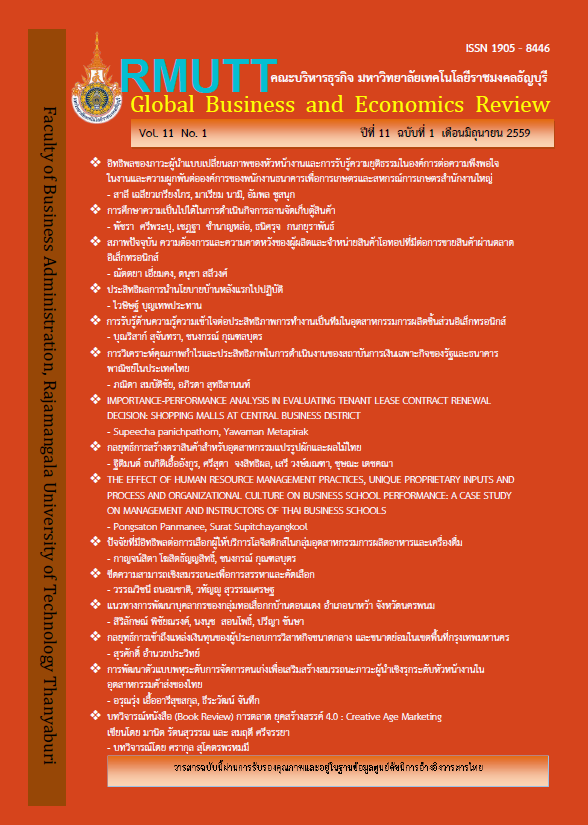อิทธิพลของภาวะผู้นำแบบเปลี่ยนสภาพของหัวหน้างานและการรับรู้ความยุติธรรมในองค์การต่อความพึงพอใจในงาน และความผูกพันต่อองค์การของพนักงานธนาคารเพื่อการเกษตรและสหกรณ์การเกษตร สำนักงานใหญ
คำสำคัญ:
ภาวะผู้นำแบบเปลี่ยนสภาพ, การรับรู้ความยุติธรรมในองค์การ, ความพึงพอใจในงาน, ความผูกพันต่อองค์การบทคัดย่อ
งานวิจัยนี้มีวัตถุประสงค์เพื่อพัฒนาและตรวจสอบความสอดคล้องของโมเดลเชิงสาเหตุของภาวะผู้นำแบบเปลี่ยนสภาพของหัวหน้างาน และการรับรู้ความยุติธรรมในองค์การต่อความพึงพอใจในงาน และความผูกพันต่อองค์การของพนักงานธนาคารเพื่อการเกษตรและสหกรณ์การเกษตร สำนักงานใหญ่ ผู้วิจัยใช้ ระเบียบวิธีการศึกษาการวิจัยเชิงปริมาณ เป็นการวิจัยเชิงประจักษ์ โดยใช้แบบสอบถามเป็นเครื่องมือในการ เก็บข้อมูลจากพนักงานที่ปฏิบัติหน้าที่ในธนาคารเพื่อการเกษตรและสหกรณ์การเกษตร สำนักงานใหญ่ จำนวน 399 คน ผลการศึกษาพบว่า (1) ภาวะผู้นำแบบเปลี่ยนสภาพของหัวหน้างานมีอิทธิพลทางบวกต่อความพึงพอใจในงานของพนักงาน (2) ภาวะผู้นำแบบเปลี่ยนสภาพของหัวหน้างานมีอิทธิพลทางบวกต่อความผูกพันต่อองค์การ (3) การรับรู้ความยุติธรรมด้านการจัดสรรผลประโยชน์มีอิทธิพลทางบวกต่อความพึงพอใจในงาน (4) การรับรู้ความยุติธรรมด้านกระบวนการมีอิทธิพลทางบวกต่อความพึงพอใจในงาน (5) การรับรู้ความยุติธรรมด้านการปฏิสัมพันธ์ไม่มีอิทธิพลต่อความพึงพอใจในงาน (6) การรับรู้ความยุติธรรมด้านการจัดสรรผลประโยชน์มีอิทธิพลทางบวกต่อความผูกพันต่อองค์การ (7) การรับรู้ความยุติธรรมด้านกระบวนการไม่มีอิทธิพลต่อความผูกพันต่อองค์การ (8) การรับรู้ความยุติธรรมด้านการปฏิสัมพันธ์ไม่มีอิทธิพลต่อความผูกพันต่อองค์การ และ (9) ความพึงพอใจในงานมีอิทธิพลทางบวกต่อความผูกพันต่อองค์การ
References
สำนักงานคณะกรรมการพัฒนาการเศรษฐกิจและสังคมแห่งชาติ. (2555). แผนพัฒนาเศรษฐกิจและสังคม แห่งชาติฉบับที่ 11. สืบค้นจาก http://www.nesdb.go.th/Portals/0/news/plan/p11/ SummaryPlan11_thai.pdf
สุวิมล สุริย์วงศ์. (2554). ความสัมพันธ์ระหว่างการรับรู้ความยุติธรรมภายในองค์การความผูกพันองค์การ และการรับรูพฤติกรรมด้านการปฏิบัติงานโดยหัวหน้างาน: กรณีศึกษาบริษัทโทรคมนาคมแห่งหนึ่ง. (รายงานวิจัย). กรุงเทพฯ: มหาวิทยาลัยธรรมศาสตร์.
Adams, J. S. (1965). Inequity in social exchange. In L. Berkowitz (Ed.), Advances in experimental social psychology. (Vol. 2, pp. 267-299). New York: Academic.
Aghdasi, S., Kiamanesh, A. R., & Ebrahim, A. N. (2011). Emotional intelligence and organizational commitment: Testing the mediatory role of occupational stress and job satisfaction. Procedia-Social and Behavioral Sciences, 29, 1965-1976.
Alniacik, E., Alniacik, Ü., Erat, S., & Akcin, K. (2013). Does person-organization fit moderate the effects of affective commitment and job satisfaction on turnover intentions?. Procedia-Social and Behavioral Sciences, 99, 274-281.
Armutlulu, I. H., & Noyan, F. (2011). A multilevel model of organizational commitment. Procedia-Social and Behavioral Sciences, 30, 2139-2143.
Bass, B. M., & Avolio, B. J.(1995). The multifactor leadership questionnaire–5x short form. Redwood: Mind Garden.
Braun,S., Peus, C., Weisweiler, S., & Frey, D. (2013). Transformational leadership, job satisfaction, and team performance: A multilevel mediation model of trust. The Leadership Quarterly, 24(1), 270-283.
Cetin, M., Karabay, M. E., & Efe, M. N. (2012). The effects of leadership styles and the communication competency of bank managers on the employee's job satisfaction: The case of Turkish banks. Procedia-Social and Behavioral Sciences, 58, 227-235.
Dundar, T., & Tabancali, E. (2012). The relationship between organizational justice perceptions and job satisfaction levels. Procedia-Social and Behavioral Sciences, 46, 5777-5781.
Field, A. (2005). Discovering statistics using SPSS (2nd Ed.). London: Sage Publications.
Greenberg, J., & Baron, R. A. (2003). Behavior in organization: Understanding and managing the liuman side of work (9th Ed.). Massachusette: Allyn & Bacon.
Hackman, J. R., & Oldham, G. R. (1975). Development of the job diagnostic survey. Journal of Abnormal and Social Psychology, 60, 159–170.
Hair, J. F., Black, W. C., Babin, B. J., Anderson, R. E., & Tatham, R. L. (2006). Multivariate data analysis (6th Ed). New Jersey: Prentice Hall.
Hair, J. F., Black, W. C., Babin, B. J., & Anderson, R. E. (2010). Multivariate data analysis (7th Ed). New Jersey: Prentice Hall.
Heponiemi, T., Elovainio, M., Kouvonen, A., Kuusio, H., Noro, A., Finne-Soveri, H., et al. (2011). The effects of ownership, staffing level and organisational justice on nurse commitment, involvement, and satisfaction: A questionnaire study. International Journal of Nursing Studies, 48(12), 1551-1561.
Katsikea, E., Theodosiou, M., Perdikis, N., & Kehagias, J. (2011). The effects of organizational structure and job characteristics on export sales managers’ job satisfaction and organizational commitment. Journal of World Business, 46(2), 221-233.
Kim, S.-g., & Kim, J. (2014). Integration strategy, transformational leadership and organozational commitment in Korea's coorporate split-offs. Procedia-Social and Behavioral Sciences, 109, 1353-1364.
Lotfi, M. H., & Pour, M. S. (2013). The relationship between organizational justice and job satisfaction among the employees of Tehran Payame Noor University. ProcediaSocial and Behavioral Sciences, 93, 2073-2079.
Meyer, J. P. & Allen, N. J. (1991). A three-component conceptualization of organizational commitment. Human resource management review, 1(1), 61-89.
Munir, R. I. S., Rahman, R. A., Malik, A. M. A., & Ma’amor, H. (2012). Relationship between transformational leadership and employees’ job satisfaction among the academic staff. Procedia-Social and Behavioral Sciences, 65, 885-890.
Nadiri, H., & Tanova, C. (2010). An investigation of the role of justice in turnover intentions, job satisfaction, and organizational citizenship behavior in hospitality industry. International Journal of Hospitality Management, 29(1), 33-41.
Nunnally, J. C. (1978). Psychometric theory (2nd Ed.). New York: McGraw-Hill.
Sareshkeh, S. K., Ghaziani, F. G., & Tayebi, S. M. (2012). Impact of organizational justice perception on job satisfaction and organizational commitment: The iranian sports federation perspective. Annals of Biological Research, 3(8), 4229-4238.
Selamat, N., Nordin, N., & Adnan, A. A. (2013). Rekindle teacher's organizational commitment: The effect of transformational leadership behavior. Procedia-Social and Behavioral Sciences, 90, 566-574.
Sieger, P., Bernhard, F., & Frey, U. (2011). Affective commitment and job satisfaction among non-family employees: Investigating the roles of justice perceptions and psychological ownership. Journal of Family Business Strategy, 2(2), 78-89.
Tugba, D., & Tabancali, E. (2012). The relationship between organizational justice perceptions and job satisfaction levels. Procedia-Social and Behavioral Sciences, 46, 5777-5781.
Usmani, S., & Jamal, S. (2013). Impact of distributive justice, procedural justice, interactional justice, temporal justice, spatial justice on job satisfaction of banking employees. Society of Interdisciplinary Business Research, 2(1), 351-383.
Zainalipour, H., Fini, A. A. S., & Mirkamali, S. M. (2010). A study of relationship between organizational justice and job satisfaction among teachers in Bandar Abbas middle school. Procedia-Social and Behavioral Sciences, 5, 1986-1990.
Zeinabadi, H. & Salehi, K. (2011). Role of procedural justice, trust, job satisfaction, and organizational commitment in organizational citizenship behavior (OCB) of teachers: Proposing a modified social exchange model. Procedia-Social and Behavioral Sciences, 29, 1472-1481.
Downloads
เผยแพร่แล้ว
How to Cite
ฉบับ
บท
License
บทความที่ได้รับการตีพิมพ์เป็นลิขสิทธิ์ของผู้นิพนธ์
ข้อความที่ปรากฏในบทความแต่ละเรื่องในวารสารวิชาการเล่มนี้เป็นความคิดเห็นส่วนตัวของผู้เขียนแต่ละท่านไม่เกี่ยวข้องกับมหาวิทยาลัยเทคโนโลยีราชมงคลธัญบุรี และคณาจารย์ท่านอื่นๆในมหาวิทยาลัยฯ แต่อย่างใด ความรับผิดชอบองค์ประกอบทั้งหมดของบทความแต่ละเรื่องเป็นของผู้เขียนแต่ละท่าน หากมีความผิดพลาดใดๆ ผู้เขียนแต่ละท่านจะรับผิดชอบบทความของตนเองแต่ผู้เดียว







